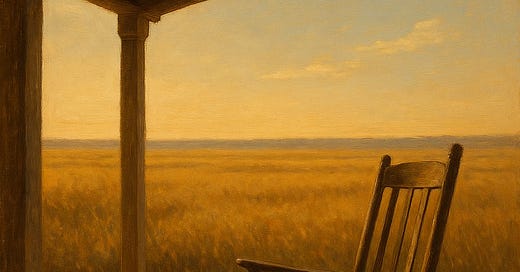On Becoming a Pretentious Bastard: How I Fell for Poetry
From mockery to meaning: learning to sit with feeling, one poem at a time.
For the longest time, I thought poetry was for assholes. Not just poetry—art, too. The kind of people who hung out in galleries, flaunted prints of old masters, and kept poetry books next to their Sartres and Joyces. The same smug tribe that watched obscure plays and talked about things like ‘form.’ You get the picture.
To me, it all reeked of highbrow posturing—a curated life of avant-garde consumption. No thanks.
Then, about a decade ago, I joined Khan Academy to understand the basics of economics. The thing that actually makes the world go round. Our new religion, in a way. And to my surprise, the act of learning itself was… lovely. Pure learning. Quiet, honest, even a little enlightening. Also: excellent for sleep.
I don’t remember much of the technical stuff now, but I came away with a sense of how things fit together. More importantly, I rediscovered something I’d forgotten—the simple joy of being taught.
That joy led me to art. Another one of those things I had once filed under ‘bullshit.’ But if I could learn to appreciate the financial system, maybe I could give paintings a shot.
So I returned to Khan Academy, this time in collaboration with the Smithsonian. Their art history course didn’t just teach me—it rewired something. It turned me into the very thing I once mocked: a pretentious bastard. But here’s the twist—it was glorious.
To understand art, especially in context, is liberating. To stand in front of a painting and know what it’s reaching for—suddenly, it’s no longer a fraud. It’s emotion. It’s connection. It’s poetry.
So naturally, poetry was next.
I picked up a few books on how to read and write poems. Lurked on subreddits. Started writing. The method was simple: take a feeling, find an image, and put it into words. That’s it. Once you allow yourself to do it, it comes surprisingly easily. And once you enjoy it, the world conspires to send you metaphors. Moments haunt you until you write them down. And in doing so, you begin to notice life more closely—which is a joy in itself.
Reading poems online—watching strangers deconstruct them—only deepened my curiosity. Eventually, I wanted to see what the masters had done. So I did the unthinkable: I bought poetry books.
That’s when something shifted.
Poetry stopped being something I was trying to ‘get’ and became something that got me. It began to loosen the knots in my chest, to name feelings I hadn’t known how to name. A good poem doesn’t just describe a moment—it lets you reside in one. Sometimes it’s a mirror. Sometimes it’s a quiet shake. But always, it makes you feel less alone in your thoughts.
That’s when I knew I wasn’t just learning—I was falling.
And let me tell you how I read them.
I don’t go front to back. Poetry isn’t fiction or newsprint. It’s not for binging or conquering. Poetry books need to be left around the house—on tables, under pillows, by the sink. One in every room, if possible. So you can pick one up without meaning to. Flip to a page. Sit near a window.
Read the poem.
Let it meet the light, the breeze, your mood. Let the view outside and the poem interact. If the poem gives you something—a breath, a shift, a small echo of truth—you’ve received its gift. And if it doesn’t, that’s fine too. Another time.
When something does land, I sit with it for a while, feeling quietly grateful—to nothing in particular, and to everything. Then I close the book. Set it down. Go about my day.
Slightly changed. Slightly more alive.
And here’s the thing: you can do this too.
You don’t need to be smart to read poetry. Or tortured. Or deep. You don’t need to ‘get it.’ You just need to show up—with a little openness, and maybe a window.
Start with Raymond Carver. Or Mary Oliver. Or a battered secondhand Neruda. Read something so slowly it takes you years to finish. Let it sink into your day. Talk about it with someone. Send it to a friend. Carry a line in your head the way you’d carry a tune. Let a single poem linger with you like a scent that won’t wash off.
Poetry isn’t for special people. It’s for people who feel. And if you’re not letting it into your life, you’re missing one of the finer, quieter celebrations of being human.
You’re missing a party made entirely of small, beautiful truths.
Don’t.
Pick up a poetry book. Leave it somewhere you’ll see it. And wait for the day it picks you.




